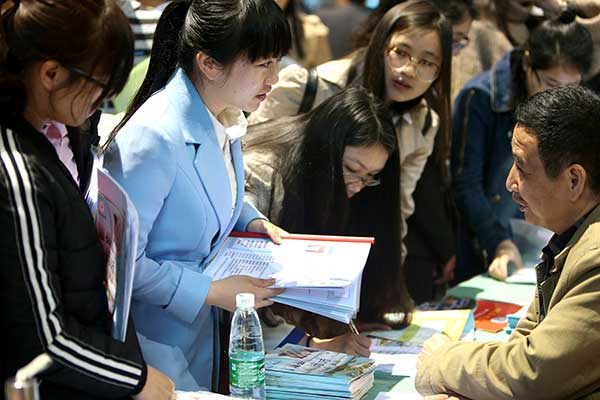University graduates are in no rush to start working
Job seekers interested in finding right slots, keeping options open
China's relatively slow economy has not cast a shadow on the employment prospects of college and university graduates, according to a new report from a leading recruitment company.
51job, a leading human resources company in China, released its report on the employment situation of graduates on Wednesday.
With a record 7.65 million students about to graduate and enter the job market in July, only 6.7 percent said they have, so far, failed to receive a job interview or are worried about getting one.
And, at the same time, graduates are becoming more picky about prospective employers, with a growing number saying they would be reluctant to tie themselves into a binding contract with an employer.
51job conducted the survey among undergraduates and those taking master's degrees and PhDs. Students from 227 universities were interviewed. All will finish their studies in July.
The results show that nearly 70 percent of graduates plan to work in the private sector. The other approximately 30 percent plan to either continue studying, start their own business, or become civil servants.
Among the job seekers, 43.3 percent said they had already received and accepted job offers.
About 25 percent of students seeking work in the private sector said they had received job offers but had not yet decided whether to accept them.
And around 17.9 percent had not yet started looking for work.
The report noted that past generations of students were more eager to find work quickly than the current batch. It said this year's graduates are not in as much of a hurry and seem more interested in finding the right position and on keeping their options open.
The tendency not to grab the first job offered is even more pronounced among students attending the nation's most elite institutions-known as project 211 and project 985 universities-which account for about 7 percent of mainland universities and colleges.
Feng Lijuan, a senior expert in human resources at 51job, said many employers are facing a challenge to attract graduates because the graduates are becoming more choosy.
"Employers have found that the real recruitment situation is the opposite of what they were expecting," said Feng. "Although the number of graduates keeps growing every year, the employment rate is still stable. Many graduates from prestigious universities are not satisfied with offers they have received and are still trying to choose the best one from what they have.
"Besides, the majority of college graduates have no financial burdens. Their families don't need them to get a job as quickly as possible."
According to the report, most graduates want to work in a prestigious city and many have a list of requirements from their prospective employers, beyond salary.
"Although they have no interest in working for the same company for a long time, they still have high expectations from their first job," she said. "The survey found graduates want to acquire skills and expertise and connections at their first job. They were not so concerned about what they could contribute to their employer or to society."










